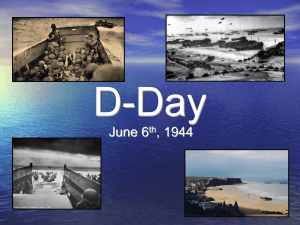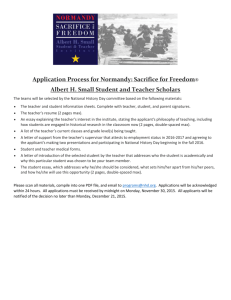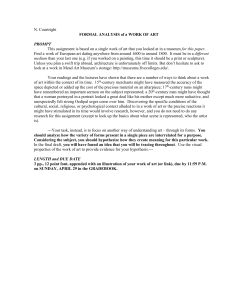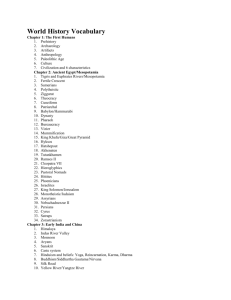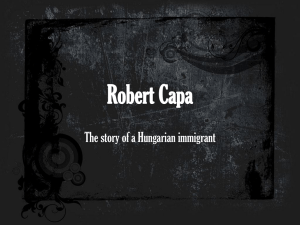HIST 290: Normandy Academy 2014 Great Debates of the Greatest
advertisement
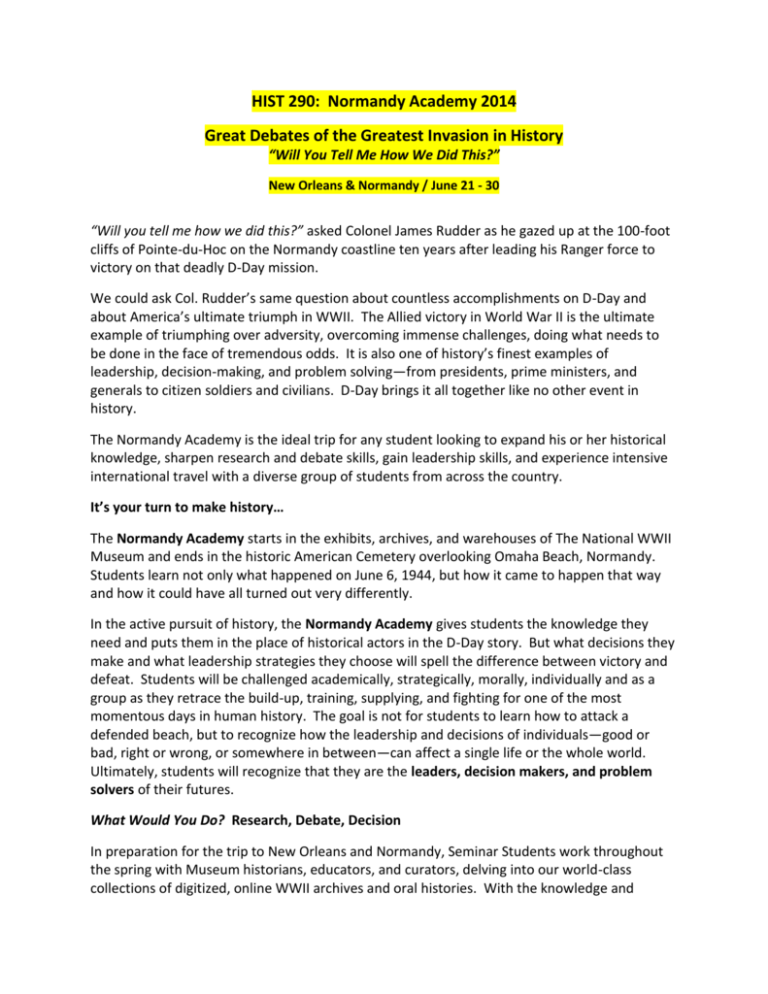
HIST 290: Normandy Academy 2014 Great Debates of the Greatest Invasion in History “Will You Tell Me How We Did This?” New Orleans & Normandy / June 21 - 30 “Will you tell me how we did this?” asked Colonel James Rudder as he gazed up at the 100-foot cliffs of Pointe-du-Hoc on the Normandy coastline ten years after leading his Ranger force to victory on that deadly D-Day mission. We could ask Col. Rudder’s same question about countless accomplishments on D-Day and about America’s ultimate triumph in WWII. The Allied victory in World War II is the ultimate example of triumphing over adversity, overcoming immense challenges, doing what needs to be done in the face of tremendous odds. It is also one of history’s finest examples of leadership, decision-making, and problem solving—from presidents, prime ministers, and generals to citizen soldiers and civilians. D-Day brings it all together like no other event in history. The Normandy Academy is the ideal trip for any student looking to expand his or her historical knowledge, sharpen research and debate skills, gain leadership skills, and experience intensive international travel with a diverse group of students from across the country. It’s your turn to make history… The Normandy Academy starts in the exhibits, archives, and warehouses of The National WWII Museum and ends in the historic American Cemetery overlooking Omaha Beach, Normandy. Students learn not only what happened on June 6, 1944, but how it came to happen that way and how it could have all turned out very differently. In the active pursuit of history, the Normandy Academy gives students the knowledge they need and puts them in the place of historical actors in the D-Day story. But what decisions they make and what leadership strategies they choose will spell the difference between victory and defeat. Students will be challenged academically, strategically, morally, individually and as a group as they retrace the build-up, training, supplying, and fighting for one of the most momentous days in human history. The goal is not for students to learn how to attack a defended beach, but to recognize how the leadership and decisions of individuals—good or bad, right or wrong, or somewhere in between—can affect a single life or the whole world. Ultimately, students will recognize that they are the leaders, decision makers, and problem solvers of their futures. What Would You Do? Research, Debate, Decision In preparation for the trip to New Orleans and Normandy, Seminar Students work throughout the spring with Museum historians, educators, and curators, delving into our world-class collections of digitized, online WWII archives and oral histories. With the knowledge and insight gained from these explorations, students develop their arguments—pro and con—for a variety of decisions made across the Normandy battlefield from generals to privates. At various battle sites in Normandy, students, in teams of three, offer point and counterpoint to those vital decisions that had to be made 70 years ago. Will the strongest arguments and best research win the day? Following a group debate and vote, the final team member provides a “what really happened” briefing. Students, in essence, become their own historians while gaining insights into leadership and character development. Evening debriefs of the day’s debates center on how students can apply the lessons learned to their lives today. Academic Benefits College credit Exploration of leadership, decision-making, and problem-solving principles International study abroad program Academically rigorous study of WWII history Interaction with the Museum’s historians, curators, and educators Historical role-playing , debate prep and presentation Normandy Academy Certificate of Completion sponsored by The National WWII Museum, The Memorial de Caen and the Université de Caen Immersion into French culture Creation of a leadership portfolio suitable for college applications Program Features Two days/three nights at The National WWII Museum in New Orleans and five days/six nights in Normandy, France at 3 star hotels throughout Special access to the Museum’s archival holdings & digitized collections Behind- the –scenes tours of the Museum’s collection vault, restoration pavilion, armored vehicle and airplane warehouse Special access to historical sites in Normandy, including Pointe-du-Hoc, Ste. Mere Eglise, Pegasus Bridge, Omaha and Utah Beaches, and the American Cemetery at Coleville-surMer 10-1 student to chaperone ratio throughout the program Exploration of careers in museums and public history Camaraderie, fun, international travel Objectives Students will: • • Identify and make connections to leadership traits integral to the Battle of Normandy that are relevant to college and career paths Learn and develop leadership skills • • • Develop their research skills through both primary and secondary source research Write clear and concise content for a specific audience of peers and museum professionals Improve presentation and debate skills as they present to both their peers and museum professionals Identify the major components of the Battle of Normandy (Beach landing, Airborne Operations, Logistics, Fighting in Hedgerows, Breakout) Learn through the personal stories of those who were there More than just a trip to France, students will spend three months preparing for their journey. All participants who seek college credit through Nicholls State University will complete required reading and assignments. Nicholls faculty and World War II Museum Research Mentors will guide students through this process which includes selections from books on D-Day, access to documents, artifacts and oral histories from the extensive collection of The National WWII Museum. Students will visit the Museum in New Orleans for a hands-on, behind-the-scenes experience before traveling to France to visit the historic sites in Normandy. Normandy Academy will take you from the pages of history books, to the sites where heroes were made, and ultimately, to the place where some of those heroes rest.

